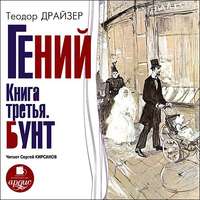 полная версия
полная версияJennie Gerhardt: A Novel
Caged in the world of the material, however, such a nature is almost invariably an anomaly. That other world of flesh into which has been woven pride and greed looks askance at the idealist, the dreamer. If one says it is sweet to look at the clouds, the answer is a warning against idleness. If one seeks to give ear to the winds, it shall be well with his soul, but they will seize upon his possessions. If all the world of the so-called inanimate delay one, calling with tenderness in sounds that seem to be too perfect to be less than understanding, it shall be ill with the body. The hands of the actual are forever reaching toward such as these – forever seizing greedily upon them. It is of such that the bond servants are made.
In the world of the actual, Jennie was such a spirit. From her earliest youth goodness and mercy had molded her every impulse. Did Sebastian fall and injure himself, it was she who struggled with straining anxiety, carried him safely to his mother. Did George complain that he was hungry, she gave him all of her bread. Many were the hours in which she had rocked her younger brothers and sisters to sleep, singing whole-heartedly betimes and dreaming far dreams. Since her earliest walking period she had been as the right hand of her mother. What scrubbing, baking, errand-running, and nursing there had been to do she did. No one had ever heard her rudely complain, though she often thought of the hardness of her lot. She knew that there were other girls whose lives were infinitely freer and fuller, but, it never occurred to her to be meanly envious; her heart might be lonely, but her lips continued to sing. When the days were fair she looked out of her kitchen window and longed to go where the meadows were. Nature's fine curves and shadows touched her as a song itself. There were times when she had gone with George and the others, leading them away to where a patch of hickory-trees flourished, because there were open fields, with shade for comfort and a brook of living water. No artist in the formulating of conceptions, her soul still responded to these things, and every sound and every sigh were welcome to her because of their beauty.
When the soft, low call or the wood-doves, those spirits of the summer, came out of the distance, she would incline her head and listen, the whole spiritual quality of it dropping like silver bubbles into her own great heart.
Where the sunlight was warm and the shadows flecked with its splendid radiance she delighted to wonder at the pattern of it, to walk where it was most golden, and follow with instinctive appreciation the holy corridors of the trees.
Color was not lost upon her. That wonderful radiance which fills the western sky at evening touched and unburdened her heart.
"I wonder," she said once with girlish simplicity, "how it would feel to float away off there among those clouds."
She had discovered a natural swing of a wild grape-vine, and was sitting in it with Martha and George.
"Oh, wouldn't it be nice if you had a boat up there," said George.
She was looking with uplifted face at a far-off cloud, a red island in a sea of silver.
"Just supposing," she said, "people could live on an island like that."
Her soul was already up there, and its elysian paths knew the lightness of her feet.
"There goes a bee," said George, noting a bumbler winging by.
"Yes," she said, dreamily, "it's going home."
"Does everything have a home?" asked Martha.
"Nearly everything," she answered.
"Do the birds go home?" questioned George.
"Yes," she said, deeply feeling the poetry of it herself, "the birds go home."
"Do the bees go home?" urged Martha.
"Yes, the bees go home."
"Do the dogs go home?" said George, who saw one traveling lonesomely along the nearby road.
"Why, of course," she said, "you know that dogs go home."
"Do the gnats?" he persisted, seeing one of those curious spirals of minute insects turning energetically in the waning light.
"Yes," she said, half believing her remark. "Listen!"
"Oho," exclaimed George, incredulously, "I wonder what kind of houses they live in."
"Listen!" she gently persisted, putting out her hand to still him.
It was that halcyon hour when the Angelus falls like a benediction upon the waning day. Far off the notes were sounding gently, and nature, now that she listened, seemed to have paused also. A scarlet-breasted robin was hopping in short spaces upon the grass before her. A humming bee hummed, a cow-bell tinkled, while some suspicious cracklings told of a secretly reconnoitering squirrel. Keeping her pretty hand weighed in the air, she listened until the long, soft notes spread and faded and her heart could hold no more. Then she arose.
"Oh," she said, clenching her fingers in an agony of poetic feeling. There were crystal tears overflowing in her eyes. The wondrous sea of feeling in her had stormed its banks. Of such was the spirit of Jennie.
CHAPTER III
The junior Senator, George Sylvester Brander, was a man of peculiar mold. In him there were joined, to a remarkable degree, the wisdom of the opportunist and the sympathetic nature of the true representative of the people. Born a native of southern Ohio, he had been raised and educated there, if one might except the two years in which he had studied law at Columbia University. He knew common and criminal law, perhaps, as well as any citizen of his State, but he had never practised with that assiduity which makes for pre-eminent success at the bar. He had made money, and had had splendid opportunities to make a great deal more if he had been willing to stultify his conscience, but that he had never been able to do. And yet his integrity had not been at all times proof against the claims of friendship. Only in the last presidential election he had thrown his support to a man for Governor who, he well knew, had no claim which a strictly honorable conscience could have recognized.
In the same way, he had been guilty of some very questionable, and one or two actually unsavory, appointments. Whenever his conscience pricked him too keenly he would endeavor to hearten himself with his pet phrase, "All in a lifetime." Thinking over things quite alone in his easy-chair, he would sometimes rise up with these words on his lips, and smile sheepishly as he did so. Conscience was not by any means dead in him. His sympathies, if anything, were keener than ever.
This man, three times Congressman from the district of which Columbus was a part, and twice United States Senator, had never married. In his youth he had had a serious love affair, but there was nothing discreditable to him in the fact that it came to nothing. The lady found it inconvenient to wait for him. He was too long in earning a competence upon which they might subsist.
Tall, straight-shouldered, neither lean nor stout, he was to-day an imposing figure. Having received his hard knocks and endured his losses, there was that about him which touched and awakened the sympathies of the imaginative. People thought him naturally agreeable, and his senatorial peers looked upon him as not any too heavy mentally, but personally a fine man.
His presence in Columbus at this particular time was due to the fact that his political fences needed careful repairing. The general election had weakened his party in the State Legislature. There were enough votes to re-elect him, but it would require the most careful political manipulation to hold them together. Other men were ambitious. There were a half-dozen available candidates, any one of whom would have rejoiced to step into his shoes. He realized the exigencies of the occasion. They could not well beat him, he thought; but even if this should happen, surely the President could be induced to give him a ministry abroad.
Yes, he might be called a successful man, but for all that Senator Brander felt that he had missed something. He had wanted to do so many things. Here he was, fifty-two years of age, clean, honorable, highly distinguished, as the world takes it, but single. He could not help looking about him now and then and speculating upon the fact that he had no one to care for him. His chamber seemed strangely hollow at times – his own personality exceedingly disagreeable.
"Fifty!" he often thought to himself. "Alone – absolutely alone."
Sitting in his chamber that Saturday afternoon, a rap at his door aroused him. He had been speculating upon the futility of his political energy in the light of the impermanence of life and fame.
"What a great fight we make to sustain ourselves!" he thought. "How little difference it will make to me a few years hence!"
He arose, and opening wide his door, perceived Jennie. She had come, as she had suggested to her mother, at this time, instead of on Monday, in order to give a more favorable impression of promptness.
"Come right in," said the Senator; and, as on the first occasion, he graciously made way for her.
Jennie passed in, momentarily expecting some compliment upon the promptitude with which the washing had been done. The Senator never noticed it at all.
"Well, my young lady," he said when she had put the bundle down, "how do you find yourself this evening?"
"Very well," replied Jennie. "We thought we'd better bring your clothes to-day instead of Monday."
"Oh, that would not have made any difference," replied Brander lightly. "Just leave them on the chair."
Jennie, without considering the fact that she had been offered no payment for the service rendered, was about to retire, had not the Senator detained her.
"How is your mother?" he asked pleasantly.
"She's very well," said Jennie simply.
"And your little sister? Is she any better?"
"The doctor thinks so," she replied.
"Sit down," he continued graciously. "I want to talk to you."
Moving to a near-by chair, the young girl seated herself.
"Hem!" he went on, clearing his throat lightly, "What seems to be the matter with her?"
"She has the measles," returned Jennie. "We thought once that she was going to die."
Brander studied her face as she said this, and he thought he saw something exceedingly pathetic there. The girl's poor clothes and her wondering admiration for his exalted station in life affected him. It made him feel almost ashamed of the comfort and luxury that surrounded him. How high up he was in the world, indeed!
"I am glad she is better now," he said kindly. "How old is your father?"
"Fifty-seven."
"And is he any better?"
"Oh yes, sir; he's around now, although he can't go out just yet."
"I believe your mother said he was a glass-blower by trade?"
"Yes, sir."
Brander well knew the depressed local conditions in this branch of manufacture. It had been part of the political issue in the last campaign. They must be in a bad way truly.
"Do all of the children go to school?" he inquired.
"Why yes, sir," returned Jennie, stammering. She was too shamefaced to own that one of the children had been obliged to leave school for the lack of shoes. The utterance of the falsehood troubled her.
He reflected awhile; then realizing that he had no good excuse for further detaining her, he arose and came over to her. From his pocket he took a thin layer of bills, and removing one, handed it to her.
"You take that," he said, "and tell your mother that I said she should use it for whatever she wants."
Jennie accepted the money with mingled feelings; it did not occur to her to look and see how much it was. The great man was so near her, the wonderful chamber in which he dwelt so impressive, that she scarcely realized what she was doing.
"Thank you," she said. "Is there any day you want your washing called for?" she added.
"Oh yes," he answered; "Monday – Monday evenings."
She went away, and in a half reverie he closed the door behind her. The interest that he felt in these people was unusual. Poverty and beauty certainly made up an affecting combination. He sat down in his chair and gave himself over to the pleasant speculations which her coming had aroused. Why should he not help them?
"I'll find out where they live," he finally resolved.
In the days that followed Jennie regularly came for the clothes. Senator Brander found himself more and more interested in her, and in time he managed to remove from her mind that timidity and fear which had made her feel uncomfortable in his presence. One thing which helped toward this was his calling her by her first name. This began with her third visit, and thereafter he used it with almost unconscious frequency.
It could scarcely be said that he did this in a fatherly spirit, for he had little of that attitude toward any one. He felt exceedingly young as he talked to this girl, and he often wondered whether it were not possible for her to perceive and appreciate him on his youthful side.
As for Jennie, she was immensely taken with the comfort and luxury surrounding this man, and subconsciously with the man himself, the most attractive she had ever known. Everything he had was fine, everything he did was gentle, distinguished, and considerate. From some far source, perhaps some old German ancestors, she had inherited an understanding and appreciation of all this. Life ought to be lived as he lived it; the privilege of being generous particularly appealed to her.
Part of her attitude was due to that of her mother, in whose mind sympathy was always a more potent factor than reason. For instance, when she brought to her the ten dollars Mrs. Gerhardt was transported with joy.
"Oh," said Jennie, "I didn't know until I got outside that it was so much. He said I should give it to you."
Mrs. Gerhardt took it, and holding it loosely in her folded hands, saw distinctly before her the tall Senator with his fine manners.
"What a fine man he is!" she said. "He has a good heart."
Frequently throughout the evening and the next day Mrs. Gerhardt commented upon this wonderful treasure-trove, repeating again and again how good he must be or how large must be his heart. When it came to washing his clothes she almost rubbed them to pieces, feeling that whatever she did she could scarcely do enough. Gerhardt was not to know. He had such stern views about accepting money without earning it that even in their distress, she would have experienced some difficulty in getting him to take it. Consequently she said nothing, but used it to buy bread and meat, and going as it did such a little way, the sudden windfall was never noticed.
Jennie, from now on, reflected this attitude toward the Senator, and, feeling so grateful toward him, she began to talk more freely. They came to be on such good terms that he gave her a little leather picture-case from his dresser which he had observed her admiring. Every time she came he found excuse to detain her, and soon discovered that, for all her soft girlishness, there lay deep-seated in her a conscious deprecation of poverty and a shame of having to own any need. He honestly admired her for this, and, seeing that her clothes were poor and her shoes worn, he began to wonder how he could help her without offending.
Not infrequently he thought to follow her some evening, and see for himself what the condition of the family might be. He was a United States Senator, however. The neighborhood they lived in must be very poor. He stopped to consider, and for the time the counsels of prudence prevailed. Consequently the contemplated visit was put off.
Early in December Senator Brander returned to Washington for three weeks, and both Mrs. Gerhardt and Jennie were surprised to learn one day that he had gone. Never had he given them less than two dollars a week for his washing, and several times it had been five. He had not realized, perhaps, what a breach his absence would make in their finances. But there was nothing to do about it; they managed to pinch along. Gerhardt, now better, searched for work at the various mills, and finding nothing, procured a saw-buck and saw, and going from door to door, sought for the privilege of sawing wood. There was not a great deal of this to do, but he managed, by the most earnest labor to earn two, and sometimes three, dollars a week. This added to what his wife earned and what Sebastian gave was enough to keep bread in their mouths, but scarcely more.
It was at the opening of the joyous Christmas-time that the bitterness of their poverty affected them most. The Germans love to make a great display at Christmas. It is the one season of the year when the fullness of their large family affection manifests itself. Warm in the appreciation of the joys of childhood, they love to see the little ones enjoy their toys and games. Father Gerhardt at his saw-buck during the weeks before Christmas thought of this very often. What would little Veronica not deserve after her long illness! How he would have liked to give each of the children a stout pair of shoes, the boys a warm cap, the girls a pretty hood. Toys and games and candy they always had had before. He hated to think of the snow-covered Christmas morning and no table richly piled with what their young hearts would most desire.
As for Mrs. Gerhardt, one could better imagine than describe her feelings. She felt so keenly about it that she could hardly bring herself to speak of the dreaded hour to her husband. She had managed to lay aside three dollars in the hope of getting enough to buy a ton of coal, and so put an end to poor George's daily pilgrimage to the coal yard, but now as the Christmas week drew near she decided to use it for gifts. Father Gerhardt was also secreting two dollars without the knowledge of his wife, thinking that on Christmas Eve he could produce it at a critical moment, and so relieve her maternal anxiety.
When the actual time arrived, however, there was very little to be said for the comfort that they got out of the occasion. The whole city was rife with Christmas atmosphere. Grocery stores and meat markets were strung with holly. The toy shops and candy stores were radiant with fine displays of everything that a self-respecting Santa Claus should have about him. Both parents and children observed it all – the former with serious thoughts of need and anxiety, the latter with wild fancy and only partially suppressed longings.
Frequently had Gerhardt said in their presence:
"Kriss Kringle is very poor this year. He hasn't so very much to give."
But no child, however poverty-stricken, could be made to believe this. Every time after so saying he looked into their eyes, but in spite of the warning, expectation flamed in them undiminished.
Christmas coming on Tuesday, the Monday before there was no school. Before going to the hotel Mrs. Gerhardt had cautioned George that he must bring enough coal from the yards to last over Christmas day. The latter went at once with his two younger sisters, but there being a dearth of good picking, it took them a long time to fill their baskets, and by night they had gathered only a scanty supply.
"Did you go for the coal?" asked Mrs. Gerhardt the first thing when she returned from the hotel that evening.
"Yes," said George.
"Did you get enough for to-morrow?"
"Yes," he replied, "I guess so."
"Well, now, I'll go and look," she replied. Taking the lamp, they went out into the woodshed where the coal was deposited.
"Oh, my!" she exclaimed when she saw it; "why, that isn't near enough. You must go right off and get some more."
"Oh," said George, pouting his lips, "I don't want to go. Let Bass go."
Bass, who had returned promptly at a quarter-past six, was already busy in the back bedroom washing and dressing preparatory to going down-town.
"No," said Mrs. Gerhardt. "Bass has worked hard all day. You must go."
"I don't want to," pouted George.
"All right," said Mrs. Gerhardt, "maybe to-morrow you'll be without a fire, and then what?"
They went back to the house, but George's conscience was too troubled to allow him to consider the case as closed.
"Bass, you come, too," he called to his elder brother when he was inside.
"Go where?" said Bass.
"To get some coal."
"No," said the former, "I guess not. What do you take me for?"
"Well, then, I'll not," said George, with an obstinate jerk of his head.
"Why didn't you get it up this afternoon?" questioned his brother sharply; "you've had all day to do it."
"Aw, I did try," said George. "We couldn't find enough. I can't get any when there ain't any, can I?"
"I guess you didn't try very hard," said the dandy.
"What's the matter now?" asked Jennie, who, coming in after having stopped at the grocer's for her mother, saw George with a solemn pout on his face.
"Oh, Bass won't go with me to get any coal?"
"Didn't you get any this afternoon?"
"Yes," said George, "but ma says I didn't get enough."
"I'll go with you," said his sister. "Bass, will you come along?"
"No," said the young man, indifferently, "I won't." He was adjusting his necktie and felt irritated.
"There ain't any," said George, "unless we get it off the cars. There wasn't any cars where I was."
"There are, too," exclaimed Bass.
"There ain't," said George.
"Oh, don't quarrel," said Jennie. "Get the baskets and let's go right now before it gets too late."
The other children, who had a fondness for their big sister, got out the implements of supply – Veronica a basket, Martha and William buckets, and George, a big clothes-basket, which he and Jennie were to fill and carry between them. Bass, moved by his sister's willingness and the little regard he still maintained for her, now made a suggestion.
"I'll tell you what you do, Jen," he said. "You go over there with the kids to Eighth Street and wait around those cars. I'll be along in a minute. When I come by don't any of you pretend to know me. Just you say, 'Mister, won't you please throw us some coal down?' and then I'll get up on the cars and pitch off enough to fill the baskets. D'ye understand?"
"All right," said Jennie, very much pleased.
Out into the snowy night they went, and made their way to the railroad tracks. At the intersection of the street and the broad railroad yard were many heavily laden cars of bituminous coal newly backed in. All of the children gathered within the shadow of one. While they were standing there, waiting the arrival of their brother, the Washington Special arrived, a long, fine train with several of the new style drawing-room cars, the big plate-glass windows shining and the passengers looking out from the depths of their comfortable chairs. The children instinctively drew back as it thundered past.
"Oh, wasn't it long?" said George.
"Wouldn't I like to be a brakeman, though," sighed William.
Jennie, alone, kept silent, but to her particularly the suggestion of travel and comfort had appealed. How beautiful life must be for the rich!
Sebastian now appeared in the distance, a mannish spring in his stride, and with every evidence that he took himself seriously. He was of that peculiar stubbornness and determination that had the children failed to carry out his plan of procedure he would have gone deliberately by and refused to help them at all.
Martha, however, took the situation as it needed to be taken, and piped out childishly, "Mister, won't you please throw us down some coal?"
Sebastian stopped abruptly, and looking sharply at them as though he were really a stranger, exclaimed, "Why, certainly," and proceeded to climb up on the car, from whence he cast down with remarkable celerity more than enough chunks to fill their baskets. Then as though not caring to linger any longer amid such plebeian company, he hastened across the network of tracks and was lost to view.
On their way home they encountered another gentleman, this time a real one, with high hat and distinguished cape coat, whom Jennie immediately recognized. This was the honorable Senator himself, newly returned from Washington, and anticipating a very unprofitable Christmas. He had arrived upon the express which had enlisted the attention of the children, and was carrying his light grip for the pleasure of it to the hotel. As he passed he thought that he recognized Jennie.
"Is that you, Jennie?" he said, and paused to be more certain.
The latter, who had discovered him even more quickly than he had her, exclaimed, "Oh, there is Mr. Brander!" Then, dropping her end of the basket, with a caution to the children to take it right home, she hurried away in the opposite direction.










